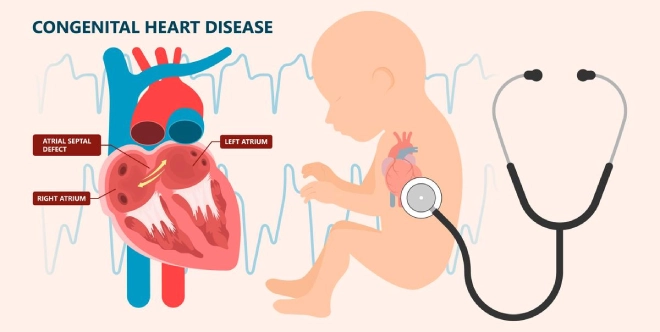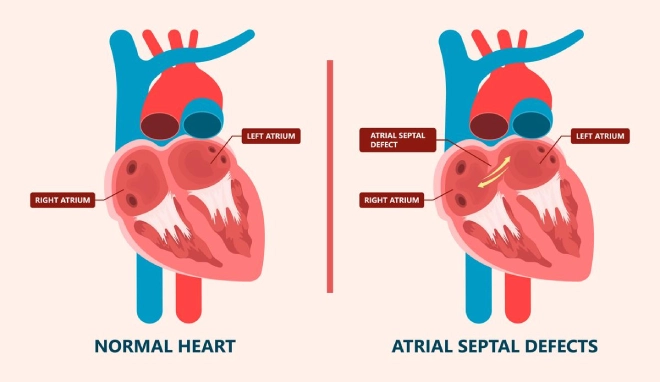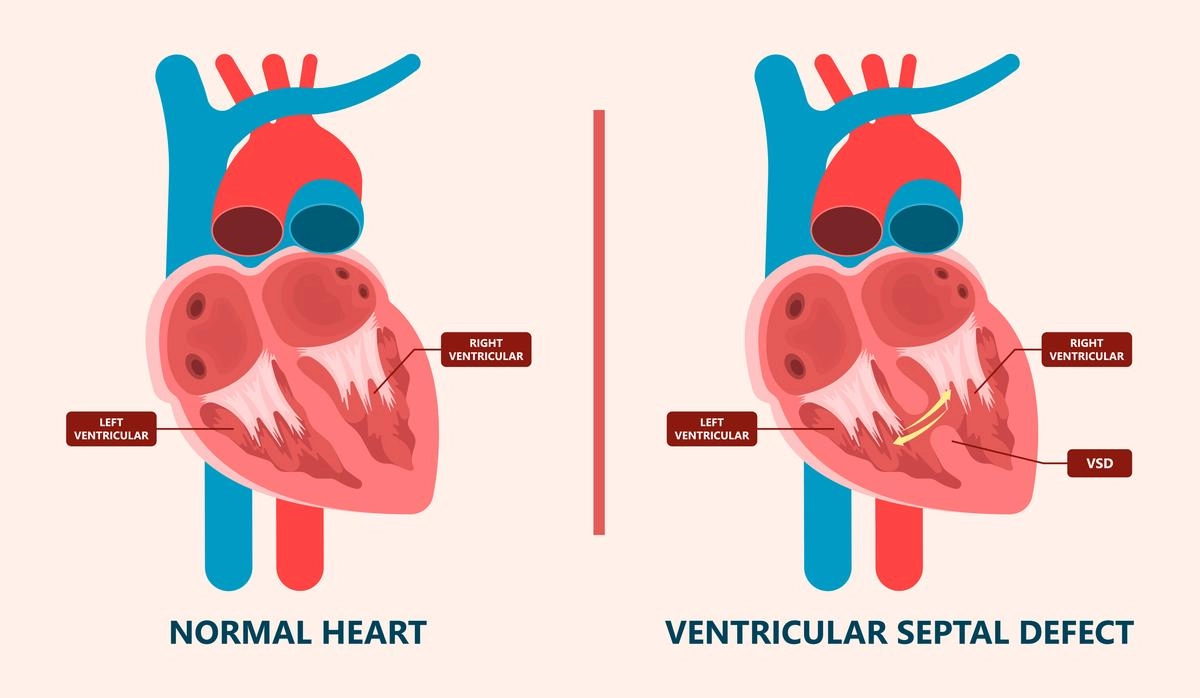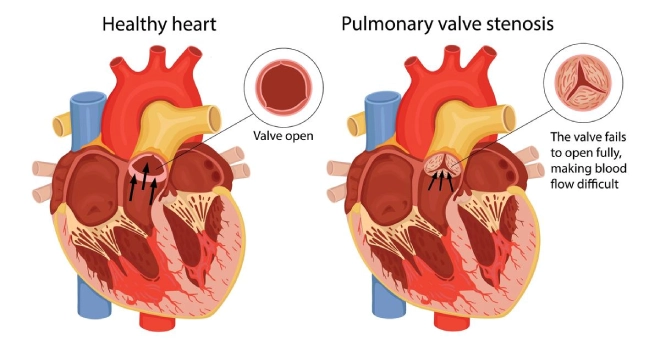Congenital Heart Disease
Congenital Heart Disease (CHD) is a Broad term for any heart defect present at birth. This includes conditions like atrial septal defects, ventricular septal defects, transposition of the great arteries, and more. It is estimated that 1 in every 100 babies is born with some form of CHD, the most common congenital disability in newborns.

Early diagnosis and treatment of CHD are essential to minimize any long-term complications or Health Risks associated with this condition. With advancements in medical technology, it is now possible to diagnose certain forms of CHD while the baby is still in utero via ultrasound.
If symptoms are Identified Prenatally, it can significantly impact the possibility of successful postnatal management and improve the quality of life for individuals living with CHD.
It's Critical to take immediate action if you believe your baby may be exhibiting congenital heart disease (CHD) signs or symptoms, such as fast breathing or a high body temperature.
Consult with Dr. Abhijeet Palshikar, Best Cardiologist in Pune from Cardiomet Clinic, who Can offer a Precise Diagnosis and go over appropriate treatment options depending on the severity of the disease. If you have any concerns about your child's heart health, don't be afraid to Get in Touch with Us
Causes of Congenital Heart Disease
Genetic and environmental factors can cause Congenital Heart Disease (CHD). Genetically, CHD can be caused by mutations in the genes responsible for normal heart development or inherited disorders.
In addition to genetics, certain environmental factors can also contribute to the development of CHD. These include maternal exposure to certain toxins such as heavy metals and Radiation, alcohol use during pregnancy, high levels of stress, and certain medications are taken while pregnant that may interfere with normal fetal circulation patterns.
Additionally, some pre-existing medical conditions are associated with a higher Risk of giving birth to an infant with CHD, including diabetes, Lupus, and Rubella.

Understanding the potential causes of CHD is important to adopt preventive measures during a woman's pregnancy and Reduce the chances of this condition occurring. However, it is always wise to speak with your doctor about any health concerns you may have before trying to conceive or just after becoming pregnant - as this will ensure you receive the best possible prenatal care for yourself and your baby.
Types of Congenital Heart Disease
Congenital Heart Disease (CHD) refers to any defect present in the heart at birth. Some of the most common forms of CHD are as follows:
- Atrial Septal Defect (ASD):
occurs when there is a hole between the two upper chambers of the heart (the left and right atrium). This can cause an abnormal flow of oxygen-rich blood from one side to the other, often requiring surgery to close the hole. Symptoms may include fatigue, shortness of breath, and rapid heartbeat.
- Ventricular Septal Defect (VSD):
This is a hole between the heart's two lower chambers (the left and right ventricles). It can lead to an increased workload on both sides of the heart, resulting in oxygen-poor blood being pumped back into circulation. Symptoms may include difficulty breathing, poor feeding, sweating while eating or sleeping, or difficulty gaining weight.
- Pulmonary Stenosis:
Pulmonary Stenosis is a narrowing in the artery that leads from the heart's main pumping chamber (the left ventricle) to the lungs. As a result, it puts extra strain on both sides of the heart and can lead to decreased circulation to certain body parts, such as fingers and toes. Symptoms may include rapid breathing or fatigue with activity.



In addition to these types, many other forms of congenital heart disease require medical attention as soon as they are identified - including tetralogy of Fallot, tricuspid atresia, transposition of great arteries, coarctation of the aorta, and more.
Discovering the complexities of Types of Congenital Heart Disease can be worrisome, but fear not. Dr. Abhijeet Palshikar, heart specialist in pune at Cardiomet Clinic offers expertise and compassionate care. But many patient ask me about What Is The Difference Between Heart Attack And Cardiac Arrest?
Diagnosis of Congenital Heart Disease
An early diagnosis of Congenital Heart Disease (CHD) is essential for a successful treatment, as it allows for timely intervention and management of the condition. The diagnostic process begins with a physical examination - listening to the Baby's Heart with a Stethoscope and Checking for Abnormal Signs or Symptoms.

After this, further tests may be recommended, such as an Electrocardiogram (ECG) or a Fetal Echocardiography, which uses ultrasound to examine the shape and structure of the baby's heart. Tests such as Magnetic Resonance Imaging (MRI) or Computed Tomography (CT) scans can also be performed if necessary.
These diagnostic tools are used to assess whether a child has CHD and its severity so that the appropriate treatment can be provided.
Early detection holds immense significance as it empowers doctors to intervene swiftly with measures like surgery or medication, preventing further decline and enhancing outcomes. Therefore, securing an accurate Diagnosis for your precious baby at the earliest becomes paramount in effectively managing congenital heart disease (CHD).
Trust in the expertise of Dr.Abhijeet Palshikar Best Heart Surgeon in Pune and caring team at Cardiomet Clinic, who specialize in treating Congenital Heart Disease in babies. With their compassionate approach and advanced medical interventions, they offer hope and support, ensuring your little one receives the best possible care on their journey towards a healthier heart.
Treatment of Congenital Heart Disease
Congenital Heart Disease (CHD) may be treated with various medical and surgical interventions. Medication is often the first line of treatment, as it can help manage symptoms and improve the quality of life for those affected.

Surgery is another option for more serious cases. It can range from simple procedures, such as closing off a defect, to more complex ones, such as valve replacements or reconstructing large heart sections. Cardiac catheterization is also used to diagnose and treat certain conditions, including some forms of CHD.
Potential risks associated with treatments for CHD include infection, bleeding, damage to surrounding tissue or organs, death, and further complications later in life. The benefits, however, can be immense - surgery can save lives and give babies a more normal life expectancy.
It is important to note that treatments do not always provide a permanent cure; it is essential to have ongoing monitoring and follow-up care after any treatment to ensure long-term health benefits are achieved. This includes regular check-ups and lifestyle changes such as diet monitoring, exercise regimes, or other therapies tailored to individual needs.
When dealing with a congenital heart defect, it's important to be aware of potential complications. One such complication is Congestive Heart Failure, which can occur in babies with significant heart defects. Recognizing signs of Congestive heart failure, such as rapid and gasping breaths, as well as poor weight gain, is crucial for timely intervention.
Dr. Abhijeet Palshikar, a Skilled heart surgeon at Cardiomet Heart Hospital in Pune, possesses the expertise needed to address these complications and provide the necessary care. Trust in his compassionate approach and the advanced facilities at Cardiomet Heart Hospital to ensure the best possible outcomes for your loved ones.
Living with Congenital Heart Disease
Managing Congenital Heart Disease (CHD) is important in leading a healthy and fulfilling life. While the condition can be challenging to those affected, various strategies can be adopted to help individuals cope with it.
The most important element is staying on top of medical care and following up with appointments regularly. This will enable doctors to monitor the condition, detect changes, and offer timely interventions if needed. Additionally, individuals should make lifestyle changes such as sticking to a balanced diet, exercising regularly, and avoiding smoking or alcohol. They should also take steps such as keeping stress levels low and getting adequate rest to stay healthy.
For those living with CHD, exercise can be beneficial in helping them stay active and maintain a normal weight. However, certain activities may need to be adjusted depending on their fitness level or type of CHD. Eating well will ensure that individuals get all the vital nutrients they need for optimum health; this includes avoiding processed foods, sodas, or high-sodium snacks in favor of fruit, vegetables, and lean proteins.
Finally, building a strong support network of family members and friends who understand the condition is important. This will provide emotional support when needed and help individuals stay motivated while managing their condition more effectively. With these tips, those living with CHD can lead happy lives!
If you or a loved one is living with Congenital Heart Disease, staying on top of medical care and following up with appointments regularly is important. Scheduling a consultation with a cardiologist can help you understand your condition better and determine what treatments and lifestyle changes would be most beneficial. Don't wait any longer - Contact Your Cardiologist today to book an appointment!


